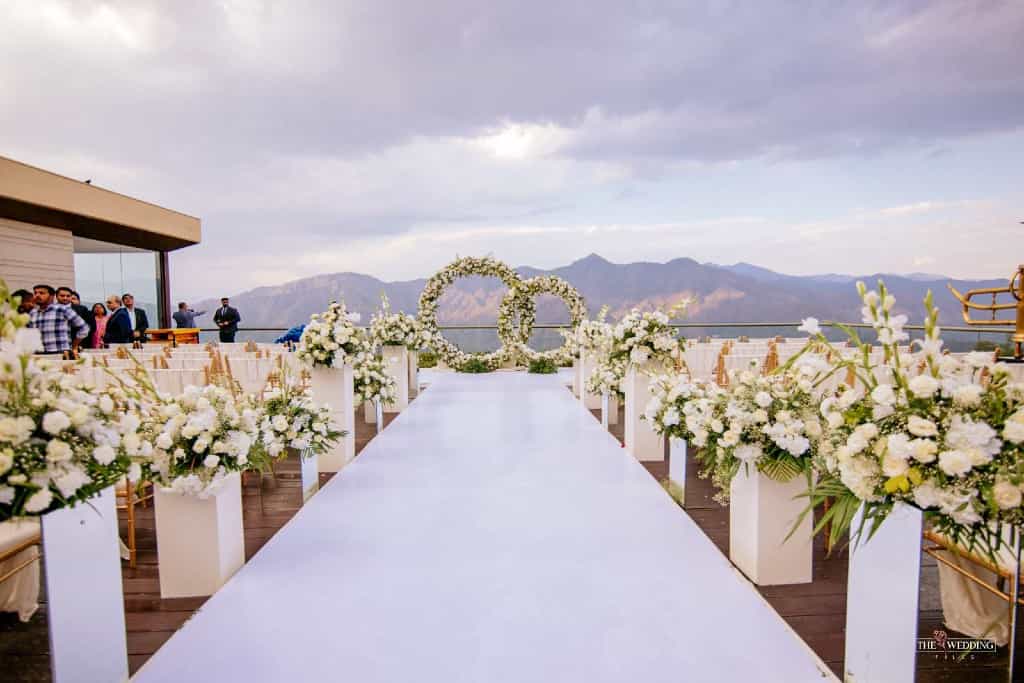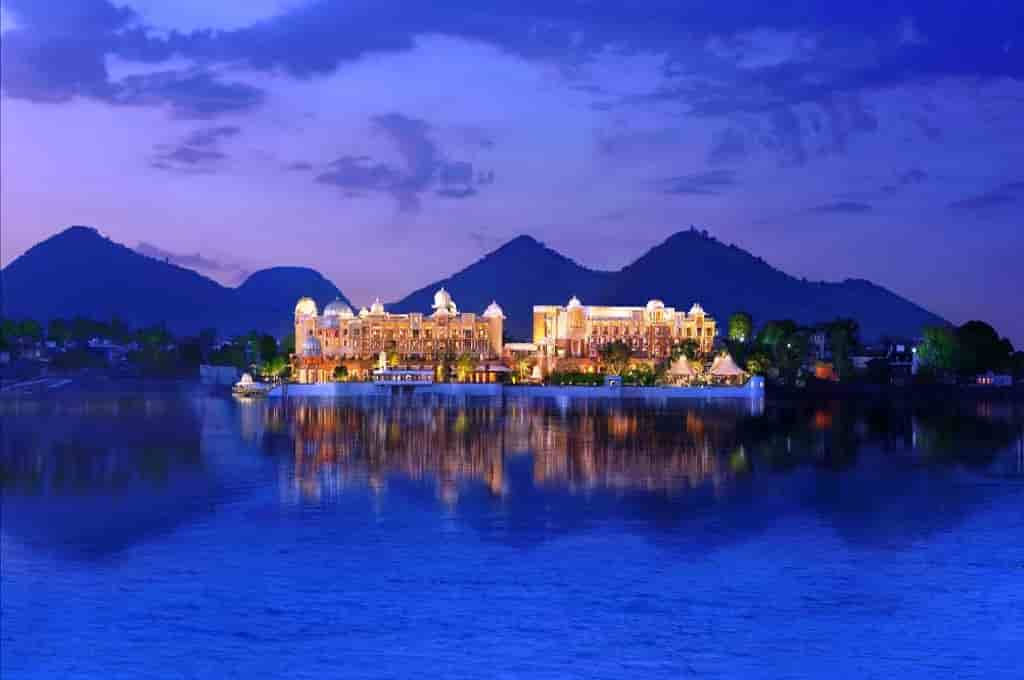How to Choose Your Destination Wedding Location?
With couples preferring to have smaller, intimate ceremonies, the destination wedding route is becoming increasingly popular. The first step in planning a destination wedding is to find the ideal location for your special day. This decision sets the tone for the entire event and plays a major role in creating a memorable experience for the couple and their guests.
For most of us, choosing the right place for a destination wedding can be challenging and overwhelming as there are so many options available. So how do you pick the perfect location? Conduct thorough research on potential wedding destinations. Look for places that align with your preferences, offer the desired ambiance, and have a good reputation for hosting weddings. Explore online resources, wedding planning websites, and social media platforms for inspiration and recommendations. A few factors should be considered before deciding on a suitable venue for your destination wedding. This blog post lists them for your convenience.
Stick to Your Personality and Vision
Your wedding should reflect your personality, both individually and as a couple, so think about your style and aspirations before deciding on a location. Outline everything you had envisioned for your wedding day. Discuss it with your partner and find out what his dreams and expectations are. You need to be specific about the kinds of experiences you want to offer to everyone. Do you want a beach wedding or one on a mountaintop? Would you rather have your ceremonies in a rustic vineyard instead of a royal palace? Are you looking for a jam-packed event or something more laid-back? Which wedding do you prefer—a grand affair or a simple one? Consider all of your options and select a space that captures your vision and feels authentic to you as a couple.

Keep Your Budget in Mind
Even if you dream about exchanging vows on the shores of Lake Como, you know in your heart that this is not a realistic option for you. Some locations are more expensive than others, so be aware of the costs associated with each of them. Begin by establishing a budget for your destination wedding. This will help narrow down your options and give you a realistic idea of what you can afford. Your budget should cover the price of travel, lodging, decor, entertainment, food, and venues. It is preferable to discuss the budget with your wedding planner, who will be able to present you with the complete picture. After you’ve totaled all of your expenses, leave some wiggle room for unforeseen expenses.
Check the Weather
Temperatures vary across the globe at any given time, thus making it an important consideration for destination weddings. In India, for example, it may be impossible to plan a wedding in May in Rajasthan, but the weather in Mussoorie will be excellent. Research the recent weather patterns in the vicinity of all your preferred locations to see how they’ll work with your wedding date. The location you choose must not be excessively hot or cold. Hurricanes, thunderstorms, and monsoons can completely derail the festivities. Things are not always within our control, and the weather may still be an issue, but when hosting outdoor events, we have to plan for optimal weather. Working out a backup plan with your planner ahead of time is always a good idea, just in case. Keep in mind that peak seasons may come with higher costs and more crowded venues.

Consider the Guest List
Before selecting the location, you should have a rough idea of the number of guests you plan to invite. If the guest list is extensive, it is unreasonable to expect everyone to travel to a distant location. The size of the resort will also be determined by the number of attendees. If you are only expecting 50 guests, a boutique hotel is preferable so that your guests do not get lost in a sprawling property. On the other hand, you will require a sizable resort if you have more than 200 attendees. The total number of guests also has an impact on the cost of lodging, meals, experiences, decor, and other expenses.
Ensure Accessibility
Flying to exotic locations and getting married there is very appealing, but it is not always feasible. The location must be easily accessible and provide adequate transportation options for all guests. Keep in mind that the guest list is likely to include young children and elderly relatives who aren’t up to extended or strenuous journeys. You don’t want your loved ones to miss the wedding due to financial constraints or poor accessibility. It is best to consult your closest friends and relatives to see if they are willing to travel to the proposed destination. Inform them ahead of time so that they can make the necessary arrangements. Consider factors such as travel time, cost, ease of transportation, and visa/passport requirements before deciding on a location for your nuptials.

Select an Accommodation
You may have decided on Goa as the location for your wedding, but you still need to find a resort to host the ceremonies. So, simply choosing a wedding destination isn’t enough. Every destination will have a range of resorts/hotels that can serve as the base for your event. Start looking for accommodations that are within your budget, can accommodate your ideal guest list, are not far from the airport, can handle special needs, and offer other experiences that you are looking for.
Do a Google search, stalk Facebook and Instagram, and find the one that resonates with you. As appealing as aesthetics may be, they should not be your only consideration. You must research the resort’s infrastructure, flexibility, and support before booking it to host a wedding event. They should have prior experience in handling wedding groups of your size. During peak wedding season, the most popular resorts are fully booked. You must plan months in advance to secure the desired resort/hotel.
Assess the Venues
Before putting down a deposit for the resort/hotel, look over the available venues. I’m sure you’d rather not keep using the same venue for each of your events. Make a list of the functions you want to host and figure out the locations for each. There are many possibilities, such as a beach, a rooftop, a banquet hall, a garden, a pool area, over the water, on a terrace, or with a view of the mountains. Your resort may not have enough space to host all of the events in different venues. In that case, you may want to consider other nearby locations for the celebration. Check to see if the proposed venue will be able to accommodate all of your guests. To properly schedule events and organize transportation, the travel time between venues must be identified. Read reviews, view photos, and, if possible, visit the locations in person or take virtual tours.

Evaluate the Food Options
I genuinely believe that food plays a significant role in the overall experience of the guests. By making the right food selections, the wedding can be more satisfying and fun for the guests. Spend some time researching the availability and cost of food and beverages. If you can fit in a few food-tasting sessions, that’s even better. Regardless of where your wedding takes place, your guests will expect excellent dining arrangements. Will the resort permit outside catering? Is there going to be enough variety? Are the desserts up to par? Will they be able to cater to dietary restrictions such as vegetarian or vegan food? These are just a few of the questions to ask when deciding on a wedding location. If your destination is international, make sure your guests are comfortable with the local food served.
Think about the Legalities, Language, and Culture
When choosing a location, one should consider the local culture, traditions, and laws. For example, in many parts of India, wearing a bikini and kissing in public are frowned upon. You must always respect the space you are in and try to adhere to its rules. Give your guests a heads-up so they don’t ruffle any feathers. If the restrictions are unacceptable to you, you should avoid the location. A language barrier can also cause a slew of issues. In such a case, make sure you have a way to communicate with the locals. If you are flying to another country, research the legal requirements for getting married there. Some countries have specific documentation, residency requirements, or waiting periods. Ensure you understand the legalities and plan accordingly. If not, will a ceremony and reception held there suffice, and you’ll decide to get married legally back home?

Check the Availability of Local Vendors and Suppliers
The availability and quality of local vendors cannot be overlooked. A wedding necessitates a plethora of vendors, including photographers, planners, decorators, makeup experts, florists, Mehndi artists, entertainers, and so on. Using local vendors is the best bet for an authentic experience, but if they are not available or do not meet your quality standards, you will need to bring them to your destination. This significantly increases the cost of your wedding because you must pay for their transportation, lodging, food, and other expenses. So, it is always preferable to find a location with a ready supply of local vendors. Furthermore, if your destination is in a remote area, you will have difficulty obtaining wedding materials such as flowers, decoration elements, exotic food items, and lots of other random stuff. You’ll have to transport them from the nearest big town, which will add to the cost and inconvenience.
Take your time, explore different options, and envision how each destination aligns with your dream wedding experience. If possible, visit your shortlisted destinations and meet with local wedding planners, vendors, and venues. They can provide valuable insights, answer your questions, and help you make an informed decision.
